Key takeaways:
- High-Performance Computing (HPC) enables rapid processing of complex problems, transforming theoretical models into practical solutions across various fields, such as climate modeling and genomics.
- Hands-on experience with HPC tools and collaborative learning significantly enhance understanding and efficiency, fostering a sense of community among learners.
- Key skills for HPC include programming proficiency, understanding parallel computing, and familiarity with HPC tools like MPI, all of which are crucial for optimizing performance and productivity.
- Engaging in challenging projects and consistent practice are essential for mastering HPC concepts, along with the benefits of mentorship and collaborative study groups.
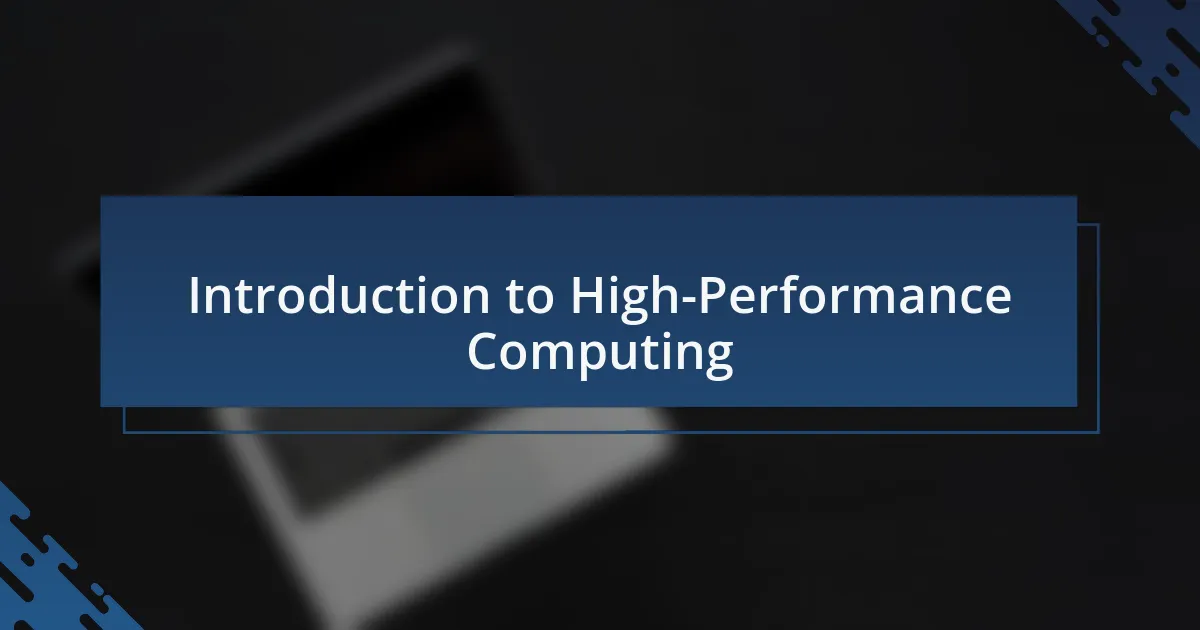
Introduction to High-Performance Computing
High-Performance Computing (HPC) is like unlocking the door to a world where complex problems meet rapid processing power. I remember my first encounter with HPC during a university project that seemed insurmountable. The moment I realized that I could run simulations in a fraction of the time using parallel processing, it was akin to discovering a hidden superpower.
This field revolves around leveraging supercomputers and clusters to tackle tasks that traditional computers would find daunting. Have you ever pondered how climate models or molecular dynamics simulations are developed? That’s where HPC shines—processing vast amounts of data, which transforms the theoretical into the practical, leading to real-world solutions. My initial curiosity about how researchers can predict weather patterns with such accuracy led me to explore these powerful tools further.
In my experience, HPC isn’t just about speed; it’s about the synergy of hardware and software working in harmony. I often reflect on how the software frameworks I learned to use made it possible to optimize resources and increase productivity dramatically. Isn’t it fascinating to consider how someone’s breakthrough could hinge on harnessing these sophisticated techniques? Sparking curiosity through HPC can lead to innovative solutions we haven’t yet imagined.
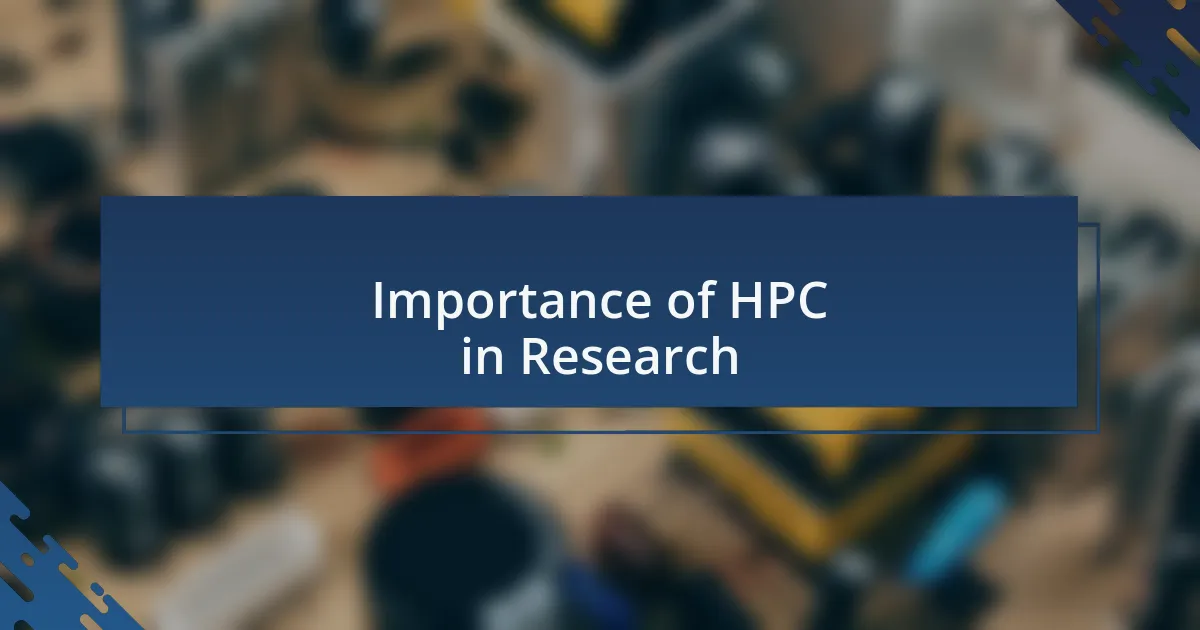
Importance of HPC in Research
The impact of High-Performance Computing in research cannot be overstated. During my time working on genomics projects, I witnessed firsthand how HPC enabled researchers to analyze massive datasets. The ability to process genetic information quickly opened new avenues for understanding diseases at unprecedented depths.
Consider the realm of astrophysics, where simulations of cosmic events require immense computational power. Once, as I delved into a simulation of black hole interactions, I was struck by the realization that HPC allows scientists to explore scenarios that are simply impossible to recreate in the lab. Have you ever thought about how many discoveries hinge on these virtual experiments? This technology empowers researchers to push the boundaries of what we know about our universe.
Moreover, HPC plays a critical role in interdisciplinary studies. In my experience collaborating with environmental scientists, the fast computations transformed complex climate modeling into actionable insights. Isn’t it remarkable how a tool like HPC can unify diverse fields, turning theoretical models into concrete predictions that influence real-world policies? This interconnectedness underscores the transformative potential of HPC across various domains of research.
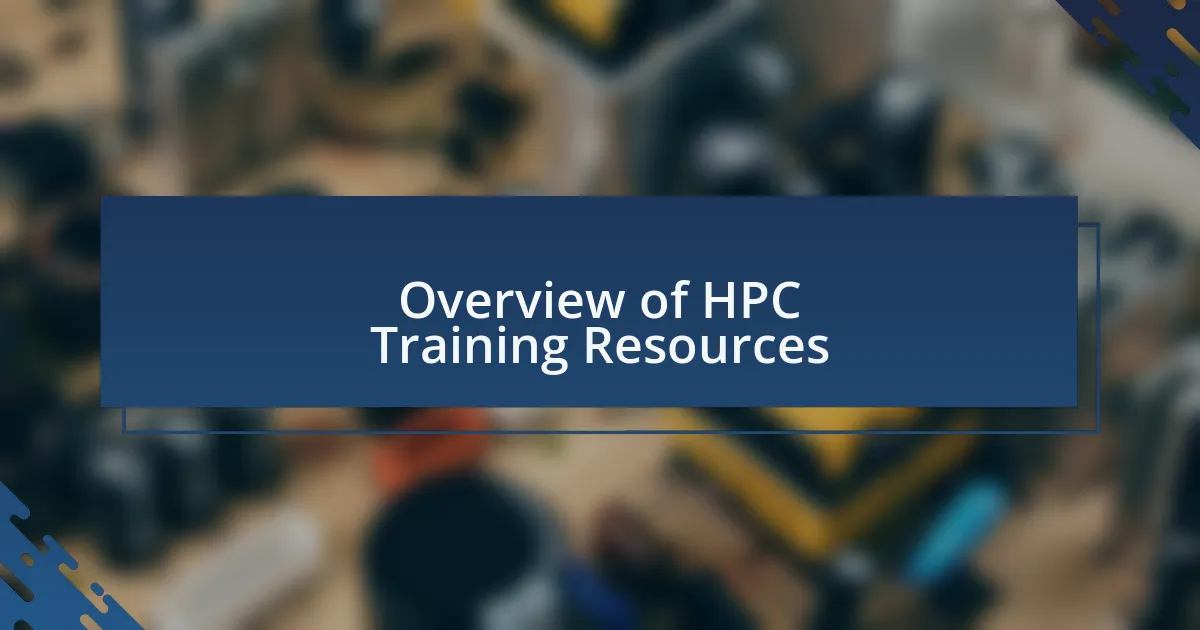
Overview of HPC Training Resources
When I first started exploring HPC training resources, I was amazed by the variety available. There are online courses, workshops, and even university programs tailored specifically to high-performance computing. I recall diving into a MOOC that broke down the fundamentals of parallel computing, and I was struck by how accessible the material was, even for someone new to the field.
Attending hands-on workshops also left a lasting impression on me. I vividly remember a two-day boot camp where I learned to use a cluster effectively; the collaborative environment fostered a real sense of community among participants. How many times can you say you’ve had the chance to troubleshoot problems alongside passionate peers? That shared experience made learning not only enjoyable but also incredibly enriching.
What’s equally exciting is the wealth of open-source resources available today. I’ve often found myself browsing GitHub repositories filled with HPC codes and tools, each one a treasure trove of knowledge. It truly engages me to realize how the HPC community generously shares its expertise, making it easier for newcomers to find their footing. Have you explored these resources yet? They might just hold the key to accelerating your own journey in high-performance computing.
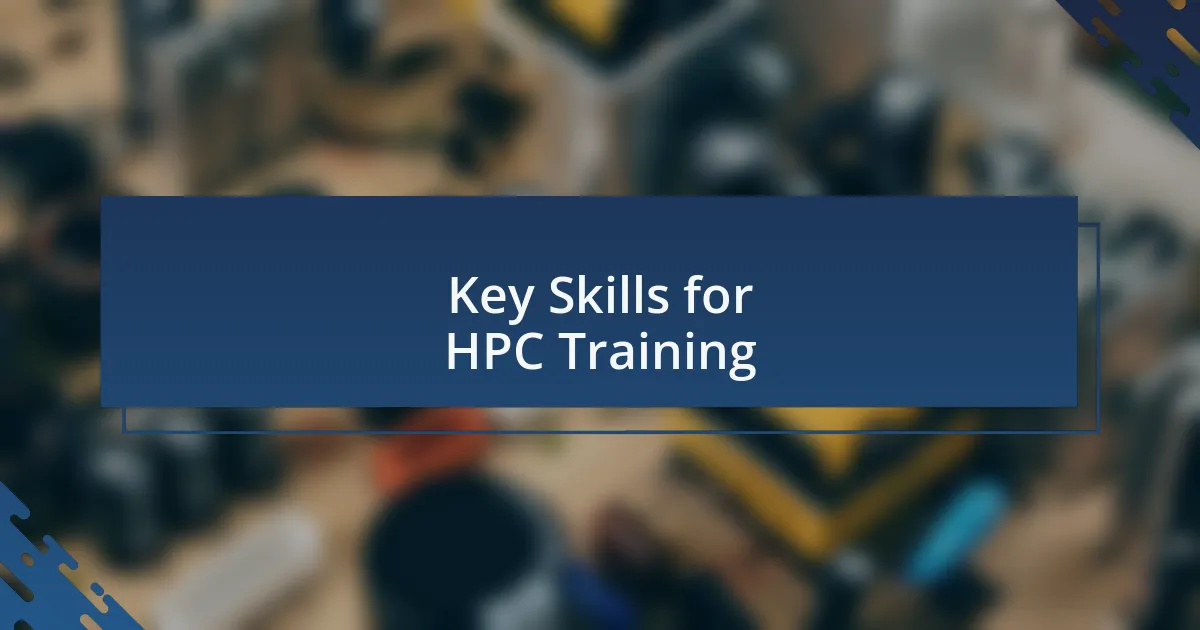
Key Skills for HPC Training
Developing a solid foundation in programming is essential for anyone entering the world of HPC. When I first began my journey, I was surprised at how much my understanding of languages like Python and C++ enhanced my ability to manipulate and analyze large datasets. Have you ever felt the rush of solving a coding problem? I remember the thrill of finally debugging a complex script; it ignited my passion for exploring more advanced concepts in high-performance computing.
Understanding parallel computing is another key skill I encountered along the way. The realization that I could break down tasks and run them simultaneously on a cluster changed my perspective entirely. I vividly recall my initial attempts to parallelize a simple algorithm; it required patience and a willingness to embrace trial and error. That journey taught me that while the learning curve can be steep, the rewards in performance optimization are staggering. Have you attempted to optimize an algorithm before? Trust me, the sense of accomplishment is worth every effort.
Lastly, I found that familiarity with HPC tools and software can significantly boost your efficiency. My exposure to software like MPI (Message Passing Interface) was a game changer. At first, the concepts were overwhelming, but as I gained hands-on experience through real-world projects, I noticed how much smoother my workflow became. It felt like unlocking a new level in a game, where I could harness the full power of the computing resources at my disposal. Have you had a moment where mastering a tool felt like a significant leap in your HPC capabilities? Those moments are what truly make the journey rewarding.
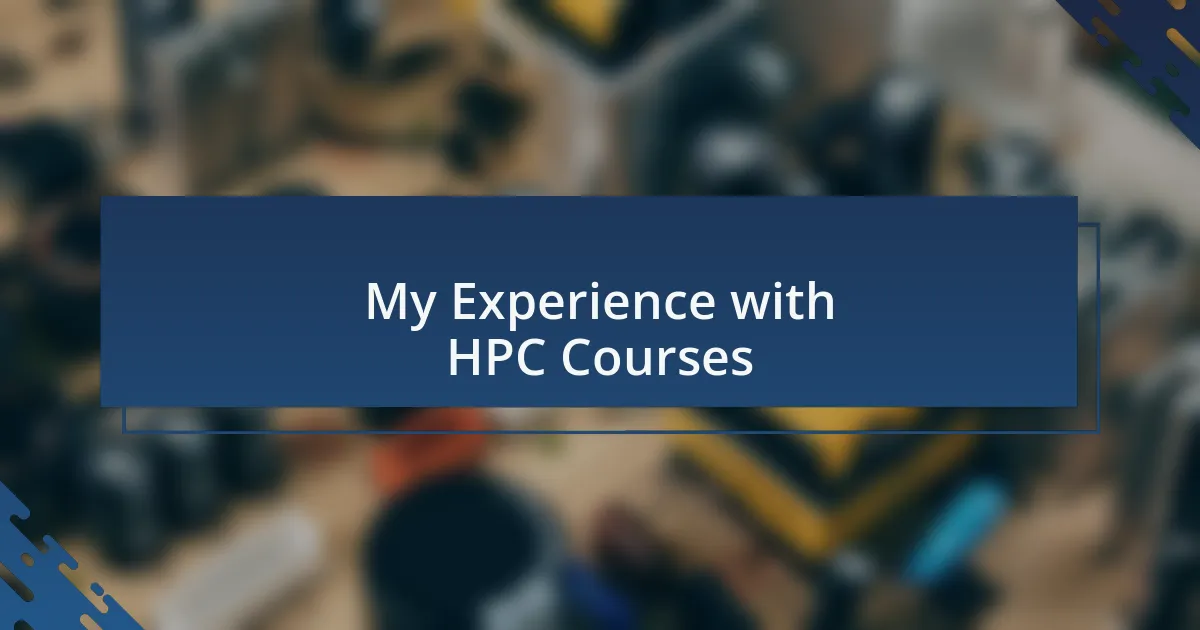
My Experience with HPC Courses
During my journey through HPC courses, I encountered various challenges that pushed me to expand my knowledge. One class focused on optimization techniques for large-scale data processing, and I remember sitting in front of my laptop, poring over case studies late into the night. The satisfaction of watching my execution times improve after applying these techniques was not just gratifying; it solidified my understanding of how critical performance can be in computational tasks.
Another memorable experience was working with simulation frameworks. In one project, my team was tasked with running astrophysical simulations, and the complexity almost felt daunting at first. I recall staring at the simulation parameters and wondering if I had the right approach. However, as we collaborated and dissected each variable, it became thrilling to see how our adjustments led to more accurate models. Have you ever worked in a group that faced seemingly insurmountable odds and emerged victorious? That sense of teamwork and achievement was a highlight of my HPC education.
Finally, I found that engaging with the HPC community enriched my learning experience immensely. I remember attending a symposium where seasoned professionals shared their insights. Listening to their real-world applications of HPC echoed my own aspirations. It was a reminder that the knowledge I’d gained wasn’t just theoretical; it had practical implications that could influence fields ranging from climate modeling to machine learning. Have you had moments where interactions with others not only guided your learning but also inspired your future path? Those connections have been instrumental in shaping my HPC journey.
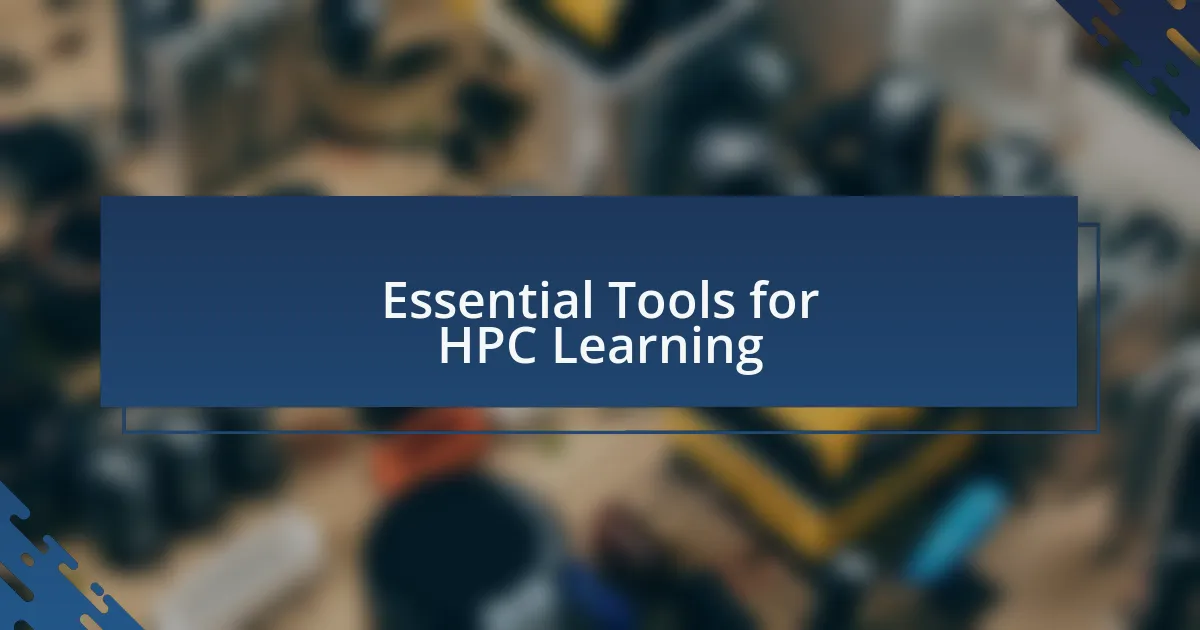
Essential Tools for HPC Learning
When I first ventured into the realm of High-Performance Computing, I quickly realized the tools I chose could make or break my learning experience. I vividly remember the early days of using parallel programming languages like MPI (Message Passing Interface). The thrill of distributing tasks across multiple computing nodes, and the satisfaction of observing performance gains in real-time, made me feel like I was wielding a powerful magic wand in the world of computing.
Another vital resource was hands-on experience with HPC clusters. I recall my first encounter with a cluster during a lab session, where the instructors guided us through job scheduling and resource management. The atmosphere was charged with excitement as we queued our jobs and watched the system seamlessly allocate resources. I often find myself wondering how it shapes one’s understanding of both the technology and teamwork when you see results unfold in real-time. Have you ever felt that rush when everything clicks, and you realize you’ve just tapped into something immensely powerful?
Lastly, I can’t stress enough the importance of documentation and community forums. They were invaluable as I encountered roadblocks and sought solutions. I recall a particularly frustrating night spent troubleshooting a memory allocation issue. Engaging with the HPC community on forums not only provided solutions but also fostered a sense of belonging. It’s fascinating how these exchanges can turn lonely nights into collaborative problem-solving adventures, enhancing both knowledge and confidence in tackling future challenges. Have you ever had a breakthrough moment thanks to a simple exchange in an online discussion?
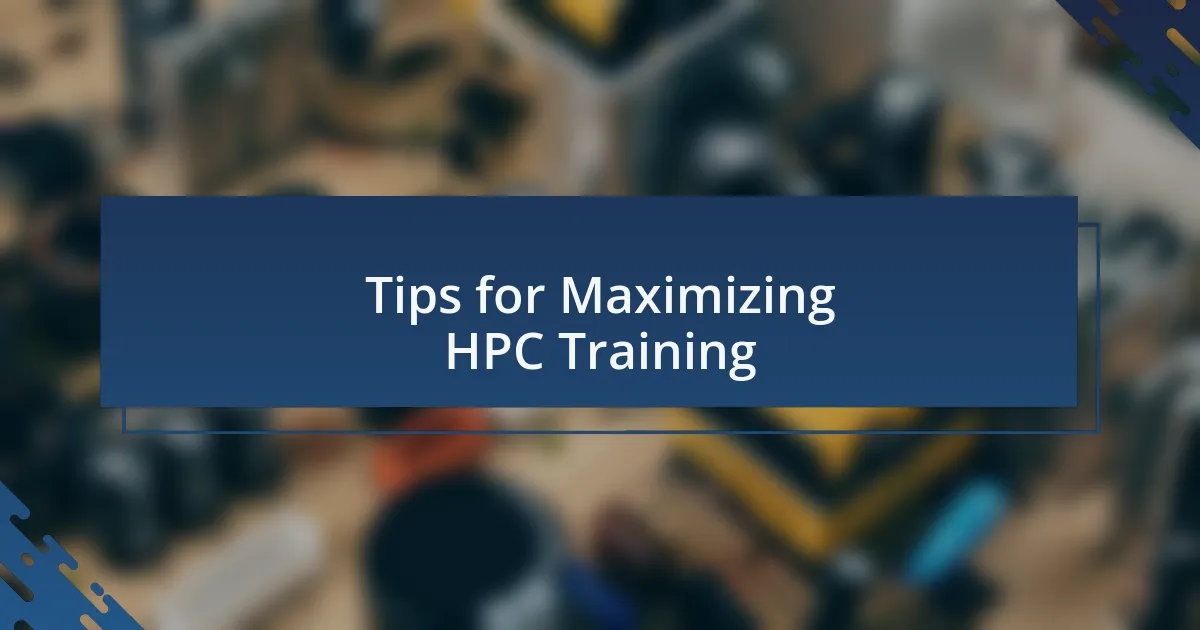
Tips for Maximizing HPC Training
To truly maximize your HPC training, I recommend immersing yourself in projects that challenge your skills. I remember taking on a project where I had to optimize an existing algorithm for parallel processing. The sense of accomplishment I felt when the output times dropped and I could visualize the improvements was exhilarating. Have you ever tackled a task that pushed you to your limits, only to discover a newfound mastery of the subject?
Another crucial tip is to develop a routine that incorporates consistent practice and exploration. While delving into theoretical concepts offers necessary knowledge, I found that dedicating time each week to hands-on coding was essential. One particular weekend, I spent hours coding simulations and running benchmarks; it turned into a rewarding habit, where every small success fueled my passion further. How often do you set aside time for deliberate practice to hone your skills?
Lastly, I cannot emphasize enough the value of forming study groups or finding a mentor within the HPC community. I still recall gathering with fellow learners to discuss complex topics and share insights gained from our experiences. Those evenings turned into brainstorming sessions filled with creativity and enthusiasm, transforming what could have felt like solitary study into an inspiring collective journey. Have you considered the power of collaboration in enhancing your understanding of HPC?